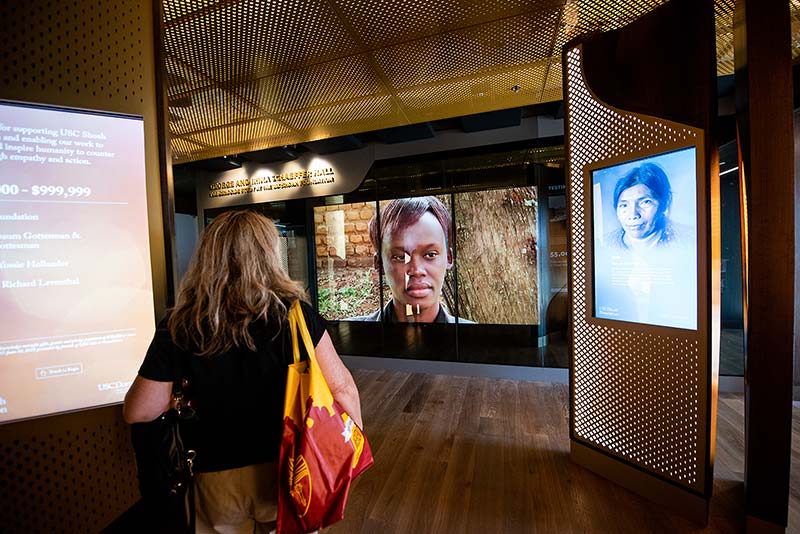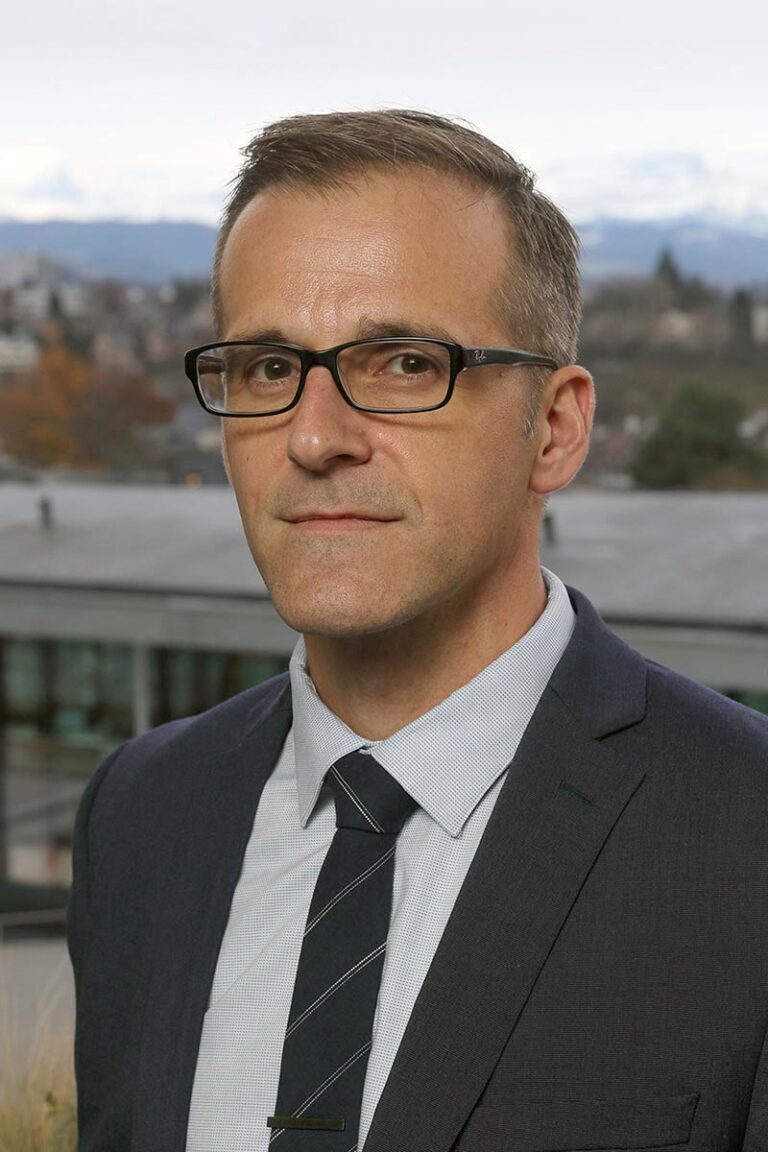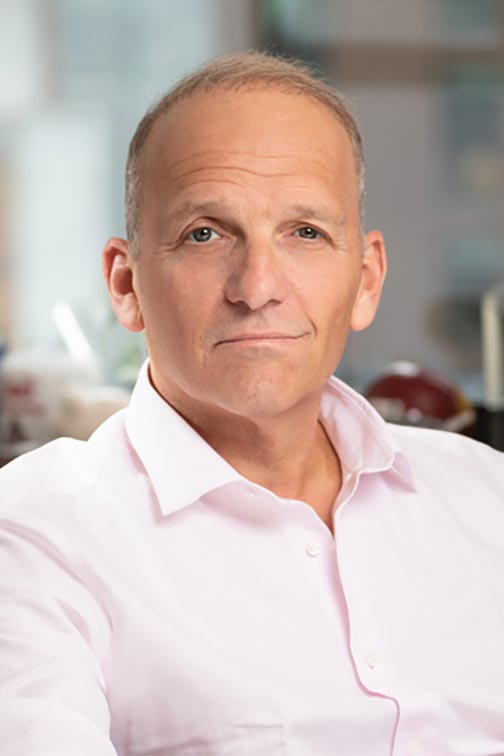USC Shoah Foundation Welcomes New Leadership
Robert J. Williams hired as Finci-Viterbi Executive Director; Joel Citron named Chair of Board of Councilors

USC Shoah Foundation has moved into the next chapter of its work, with noted international expert and governmental advisor on Holocaust remembrance and antisemitism Dr. Robert Williams appointed as Andrew J. and Erna Finci Viterbi Executive Director.
Formerly Deputy Director of International Affairs at the United States Holocaust Memorial Museum (USHMM), Williams has long been a U.S. delegate to the International Holocaust Remembrance Alliance and brings decades of experience to the Institute. He will take office on October 31, following the interim administration led by Dr. Kori Street which met and exceeded the Institute’s strategic goals.
“The work of USC Shoah Foundation is more important and more relevant than ever— especially given the rising threats to democratic values we see every day around the world,” said Steven Spielberg, founder of USC Shoah Foundation. “I’m deeply grateful to have Rob leading our organization and continuing our work to fulfill the sacred responsibility we have to survivors by ensuring their testimonies live on forever.”
 Williams joins the organization as it continues to scale its activities and impact by adding new testimonies to its 55,000-strong Visual History Archive (VHA), developing strategic partnerships and producing innovative education resources and curriculum that reach millions of people around the world.
Williams joins the organization as it continues to scale its activities and impact by adding new testimonies to its 55,000-strong Visual History Archive (VHA), developing strategic partnerships and producing innovative education resources and curriculum that reach millions of people around the world.
President Carol L. Folt said that Williams is the right leader at the right time. “Rob is a well-respected leader known for his talent, vision and compassion. He’s exactly the person to ensure this treasured and irreplaceable archive of humanity will be protected and preserved for all time. And he will draw on his experience at the USHMM to make sure the Institute becomes even more accessible and impactful in the world.”
From his time at USHMM, Williams has an established relationship with the Institute working with the VHA, the largest digital collection of its kind in the world.
The Visual History Archive contains testimonies from survivors and witnesses of the Holocaust, the Armenian Genocide, the Cambodia and Guatemalan genocides, the Genocide against the Tutsi in Rwanda, the Nanjing Massacre, contemporary antisemitism, and more. The testimonies were collected in 43 languages from 65 countries. Most include the interviewee’s personal history from before, during, and after their first-hand experience with genocide. Scholars use the testimonies — which average just over two hours in length — to inform research for books, articles, dissertations, and in their teaching.
Williams considers USC Shoah Foundation to be a pillar of global Holocaust education and research and intends to explore ways to further expand the Institute’s influence and work.
“Working from the strong foundations already in place, including its dynamic team of experts, we can secure the role of USC Shoah Foundation as an essential resource on the Holocaust and mass violence. Our work will allow others to gain new insights, informing the development of communities that prioritize mutual respect and reject indifference to injustices and atrocities,” said Williams.
A Scholar of History and Global Expert
Williams began his career at USHMM as a researcher in 2008. He has long been a U.S. delegate to the International Holocaust Remembrance Alliance, where he is a senior member of the Global Task Force Against Holocaust Distortion and chaired the Committee on Antisemitism and Holocaust Denial. In addition to helping establish several academic and research initiatives, he advises and works with multiple governments, intergovernmental organizations, and civil society organizations on antisemitism and Holocaust issues.
His doctorate is in German history, and his research specialties include U.S. and Russian foreign policy, propaganda and disinformation, and contemporary antisemitism.
“Sadly, the Holocaust is a subject that is all too prone to misuse and distortion,” Williams said. “In part, this is the result of a lack of awareness of the Holocaust, but it is also because there is a clear need for the global public to develop a better understanding of the history and why it matters today.”
He believes that if a better job is done in bringing people to the subject and educating them, manipulation and propaganda will have less of an effect.
“It's a very important moment for Holocaust history,” Williams said. “While the voices of our survivors will live on forever, we have reached a point where many won’t be in person to share their stories, so it is our responsibility to help carry forth and learn from the legacy of this history.”
A Personal Connection to the Archive
Joel Citron, a member of the university’s search committee and longtime USC Shoah Foundation Councilor, was also named this week as chair of USC Shoah Foundation’s Board of Councilors. He succeeds Lee Liberman, who takes on an emeritus role.
 Citron, chief executive officer of Tenth Avenue Holdings, is a double Trojan alum and parent who has a personal connection to the work of the Institute: both his parents and an aunt are Holocaust survivors and their interviews are included in the archive.
Citron, chief executive officer of Tenth Avenue Holdings, is a double Trojan alum and parent who has a personal connection to the work of the Institute: both his parents and an aunt are Holocaust survivors and their interviews are included in the archive.
“I feel the mission of the Institute is really part of every fiber of my being,” he said. “It’s my parents, and it’s my community. It is very, very important to me to do the best I possibly can.”
The Institute was established in 1994 by filmmaker Steven Spielberg following the production of Schindler’s List, his Academy Award-winning film about a German industrialist who saved more than a thousand mostly Polish-Jewish refugees from the Holocaust during World War II. The Institute became a part of USC in 2006.
Citron is looking forward to working with Williams’ global network of thought leaders, heads of non-governmental organizations, and subject matter experts. He is also pleased that Williams has existing knowledge of USC Shoah Foundation and has already collaborated with the staff, and shares a commitment to preserving the stories and testimonies in the VHA archive.
Citron added that he is “impressed and grateful” for the way Folt has focused attention on USC Shoah Foundation at the university.
“The Institute enters this exciting new stage with not only an ability to integrate and build community within USC, but also outside the university to an extent I’m not sure we could have done before,” he said.
“We are so fortunate that Joel will be bringing his passion, dedication and leadership to the Institute,” Folt said. “I am grateful to interim Executive Director Kori Street and the entire staff who have been working diligently to expand the global reach of this critical resource for current and future generations.”
In addition to its global education, outreach and research programs, USC Shoah Foundation plays an important role at the university, regularly hosting lectures, events and conducting programming for students, faculty and staff. The “Stronger Than Hate” initiative, founded at USC Shoah Foundation, now involves the entire university community in an effort to promote inclusivity, connection and support.
President Folt said she is grateful to the search committee for its care and hard work throughout the process and expressed her appreciation to the Board of Councilors for its exceptional efforts in maintaining the important momentum of the Institute.
Like this article? Get our e-newsletter.
Be the first to learn about new articles and personal stories like the one you've just read.
